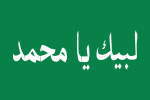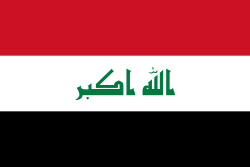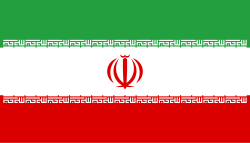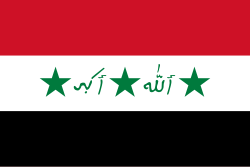Mírové brigády
| سرايا السلام | |
|---|---|
| Účast na Válce v Iráku a Povstání v Iráku | |
 Vlajka Mírových brigád | |
| Základní info | |
| Aktivní | 2003–2008 2014–současnost |
| Operační území | Irák, Sýrie |
| Ideologie |
|
| Velitel | Muktada Sadr |
| Základny | Nadžáf, Kúfa, Bagdád |
| Síla | 10 000–50 000 (2014 odhady) |
| Částí | Lidové mobilizační síly (od roku 2014) |
| Spojenci |
|
| Oponenti |
|
| Konflikty/boje |
|
Mírové brigády (arabsky سرايا السلام, Saraját al Salám), původně Mahdího armáda (arabsky جیش المهدی, Džajš al-Mahdí), označována také jako „Mahdího milice“, „Sadrova milice“, „Mahdího brigády“ apod., je polovojenská organizace vytvořená ší'itským duchovním Muktadou Sadrem v červnu roku 2003. Mahdího armáda vešla ve známost 4. dubna 2004, kdy zahájila ozbrojené povstání proti americkým vojskům v Iráku. Toto povstání skončilo v červnu 2004. Historicky se svým názvem Mahdího armáda odvolává na povstání v Súdánu, které bylo vyvoláno po anexi Egypta Velkou Británií v roce 1882 a vznikem mocenského vakua v Súdánu, bývalé egyptské provincii.
Historie
Počátky
Zpočátku byla Mahdího armáda tvořena malým počtem šíitských studentů navštěvujících semináře v baghdádské čtvrti Sadr (dříve Saddám City). Po obsazení Baghdádu americkou armádou 9. dubna 2003 převzali tito studenti odpovědnost za bezpečnost, distribuci humanitární pomoci a ochranu chudých šíitských spoluobčanů.

Časem se počet členů Mahdího armády vyšplhal na 10 000 mužů. Ačkoliv Muqtada Sadr americkou přítomnost ve svých kázání kritizoval, netoleroval žádné ozbrojené střety s americkými vojáky.
V dubnu 2004 však došlo k obratu, když bylo rozhodnuto o zákazu novin Al-Hauza a zatčení jeho několika blízkých spolupracovníků, přešel Muqtada Sadr do protiútoku. Po jeho plamenném projevu se následující den zvedla vlna protestů, které vyvrcholily v ozbrojené povstání Mahdího armády.
Povstání Mahdího armády (2004)

Po zahájení povstání obsadily jednotky Mahdího armády Nadžaf, Kúfu, Al-Kút a Sadr City. Později převzaly kontrolu nad městem Karbalá. Další útoky na koaliční vojska se objevily Násiriji a Basře.
- 16. dubna se podařilo koaličním silám odrazit jednotky Mahdího armády u města Al-Kút. Nicméně povstalci si udrželi své pozice ve městech Nadžaf, Kúfa a Karbalá.
- 4. května po neúspěšných mírových rozhovorech zaútočily koaliční síly na jihu Iráku s cílem vytlačit povstalce.
- 24. května poté co povstalci utrpěli těžké ztráty a stáhli se z města Karbalá.
- 6. června nařídil Muqtada Sadr ukončení bojů a zastavení útoků na americké jednotky. Celkové ztráty jednotek Mahdího armády byly odhadnuty na 1500 mužů.
Poválečný Irák
Reference
V tomto článku byl použit překlad textu z článku Армия Махди na ruské Wikipedii.
Média použitá na této stránce
Flag of Iran. The tricolor flag was introduced in 1906, but after the Islamic Revolution of 1979 the Arabic words 'Allahu akbar' ('God is great'), written in the Kufic script of the Qur'an and repeated 22 times, were added to the red and green strips where they border the white central strip and in the middle is the emblem of Iran (which is a stylized Persian alphabet of the Arabic word Allah ("God")).
The official ISIRI standard (translation at FotW) gives two slightly different methods of construction for the flag: a compass-and-straightedge construction used for File:Flag of Iran (official).svg, and a "simplified" construction sheet with rational numbers used for this file.
The en:Shahada in white calligraphy on a green background. Reported as the "Flag of Hamas" in flaggenlexikon.de . Uploaded 2007.
The Flags of the World website discussed the validity of this flag after it was displayed as an alleged "flag of Hamas" by Wikipedia in 2007.
According to a 2006 comment:
- "The military branch of Hamas has a different flag, green with Shahada on it. Maybe that's why there is a confusion about the Hamas flag. One is white with Hamas emblem on it, and the military branch's flag is green with a shahada? At least, the green flag is there at all protests and demonstrations." (Valentin Poposki, 03 Mar 2006)
Use of this flag was reported as early as 2001:
- "Hamas' flag is green (Muslim colour) with Arabic words in white. I saw this flag several times at Hamas demonstrations and at generic anti-Israel events in Palestine. Hamas emblem is here." (Santiago Tazón, 20 Dec 2001)
While this flag has apparently been spotted in Hamas demonstrations since at least 2001, it cannot be identified as "the flag of Hamas". It has rather been carried by Hamas supporters as symbolizing Islam or Islamism, not as an emblem of Hamas as an organization.
- "It would be wrong to name the flag as the Hamas flag. Such flags, with the Sha'ada in white on green or black, are used by other Islamic groups and are not unique to Hamas. Therefore it is not the 'Hamas flag' but rather a flag used also by the Hamas." (Dov Gutterman, 29 Mar 2003)
Flag of the Islamic State (IS), also known as "Islamic State of Iraq and Syria" (ISIS) or "Islamic State of Iraq and the Levant" (ISIL). This flag is also used by al-Shabaab, al-Qaeda in the Arabian Peninsula (AQAP), al-Qaeda in the Islamic Maghreb (AQIM), and Boko Haram.
Autor: Tan Khaerr, Licence: CC BY-SA 4.0
Drapeau du Kata'ib Hezbollah (sans logo)
Flag of Muqtada al-Sadr's Mahdi Army
The Shahada written in white on a black background. The first known flag was the previous one seen behind Bin Laden in Khost during 1996 or 1998
Flag of the Promised Day Brigades' a Shiite militia in Iraq aligned with the Sadrist movement.
Autor: Orlovic, Licence: CC BY-SA 3.0
The current fighting in Iraq. I will update it if needed.
Autor: Aldanimarki, Licence: CC BY-SA 4.0
Flag of the Islamic Army in Iraq as depicted in some of their propaganda videos released at the height of the Iraqi Insurgency
This flag was used in October 29 2004 and March 28 2005 videos. The text is written in Naskh script. Neither this version nor other versions of the AQI flag listed below used elaborate calligraphy. This is probably because they are handmade (which may also explain the differences between them).
In a flag used in January 2005 the w:Shahada is not split, and the organization name is written in Riqa'ah script.
In an earlier flag used in October 2004 (first video of Shosei Koda) [1][2] the text and circle are white, the Shahada, written in Riqa'ah, is not split, "Tanzim Qa'idat al-Jihad" is in Naskh, and "fi Bilad ar-Rafidayn" is in Riqa'ah.
In yet another flag (date unknown), all the script is in Riqa'ah.Former Iraqi flag, used from 1991 to 2004.
The flag of the Multi-National Force – Iraq.












